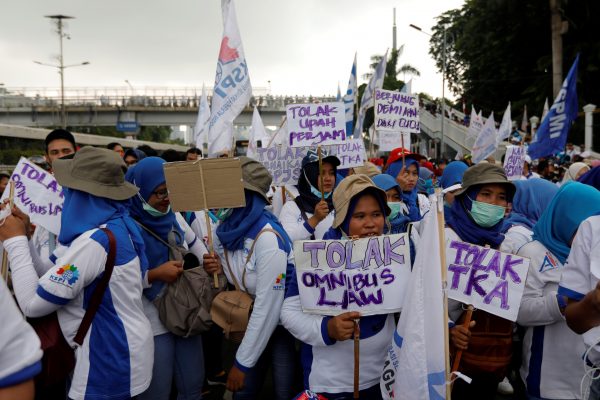The COVID-19 pandemic has developed into one of the greatest challenges to international trade and investment. Instincts to restrict global commerce goes against the interconnectedness that is vital for global value chains (GVCs).
The World Trade Organization expects international trade to fall between 13–32 per cent and the UN Conference on Trade and Development forecasts that FDI will fall by 40 per cent. This is especially challenging for a country like Indonesia that is struggling to attract FDI while also showing a decline in GVC participation.
Before the COVID-19 outbreak, the US–China trade war had started pushing corporations to explore alternative business locations to circumvent the increase in tariffs. As the outbreak shuts down global supply chains, multinational enterprises (MNEs) are under pressure to diversify supply chains beyond China.
China’s major trade and investment partners are actively encouraging their corporations to return home due to the pandemic. The US government is mulling the possibility of absorbing all reshoring costs, South Korea is offering over US$3.6 billion in reshoring loans and Japan is allocating US$2 billion for a rescue package to help companies with reshoring operations.
But many MNEs prefer to relocate their Chinese facilities to Southeast Asia. The main reason is the availability of low-cost labour and investment incentives. Reports state that the pandemic has spurred on Apple and Google’s exploration of alternative locations (that began in 2019) in Vietnam and Thailand.
Nearly one thousand Japanese manufacturers are diversifying procurement away from China. The Japanese government is allocating over US$200 million towards the diversification of production across Southeast Asia. Amid the dark clouds on global investment, Southeast Asian economies may benefit from an exodus from China.
Such GVC diversion should have been welcome news for Indonesia as the largest economy in Southeast Asia. Yet compared to its neighbours, Indonesia is relatively unattractive to foreign investors. Due to restrictions on FDI, as well as weak infrastructure and higher labour costs, Indonesia was largely bypassed by 33 Chinese-listed companies looking for alternative business locations in 2019.
Without serious efforts to reduce FDI restrictions, Indonesia will fall even further behind after the COVID-19 crisis ends. The World Bank similarly states that the highly complex regulatory landscape in Indonesia is a major deterrent for foreign investors. It points to the sheer number of ministerial and regional regulations, and the many inconsistencies they cause.
There are nearly 15,000 ministerial regulations in Indonesia, 95 per cent of which were issued since 2010. Each province, city and regency can also issue their own regulations. Added to this are sectoral-specific policies, issued by the ministers of Transportation, Education, Agriculture, Energy and Mineral Resources, Construction, Communication and Information Technology, and Tourism. After escaping this central regulatory labyrinth, investors need to overcome hundreds of regional regulations.
If this ‘regulatory obesity’ is not addressed, Indonesia will continue to struggle to attract foreign investors. The Jokowi government expects to use the Omnibus Law to revoke or revise over 1200 articles in 79 laws deemed problematic for investors. The bill covers a broad swathe of policy — from licensing to economic zones — sending a positive signal to the investment community.
But there is staunch public opposition to the bill, especially from labour unions, due to its perceived lack of transparency and rushed process. This has led to a slowdown in the deliberation process and possible rebranding of the bill itself.
The bill’s contents cast doubt on its ‘simplification’ role. First, it trims the highest level of regulation — the laws themselves — while Indonesia’s ‘regulatory obesity’ is actually far below at the ministerial level.
Second, in the Indonesian legal system, changing an article in a law does not automatically void its implemented regulations, risking overlap between old and new rules.
Third, the bill sets out an ambitious legislative and political timeline for its roll out. Hundreds of subsequent adjustments and drafts must be done within one month of the bill passing, compromising the overall quality of the proposed reforms.
Lastly, the bill still does not cover all of the regulations that pose unnecessary burdens to businesses. The Indonesian government should not consider the bill as the final goal of reform, but as the starting momentum needed to usher in greater economic openness in the future.
While the COVID-19 crisis crystallises the need for regulatory reform, the Indonesian government should not put too much weight on the speed of reform at the expense of its quality. This is no easy task, especially as the pressure for a quick economic recovery following the crisis amplifies.
Arianto A Patunru is a member of the Indonesia Project and a Fellow at the Arndt-Corden Department of Economics, The Australian National University (ANU).
Andree Surianta is an Australia Awards PhD Scholar at the Crawford School of Public Policy, ANU, and a research associate at the Centre for Indonesian Policy Studies (CIPS), Jakarta.
This article is part of an EAF special feature series on the novel coronavirus crisis and its impact.

